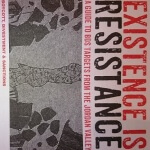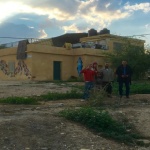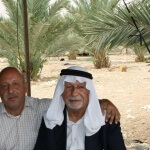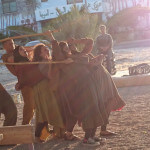Boycott divestment & sanctions
Jordan Valley Solidarity supports the international call – made by Palestinian civil society – for the full boycott of and divestment from Israeli companies complicit in the illegal occupation of the West Bank and Syrian Golan and the siege of Gaza. We also believe this extends to those companies – such as supermarkets and universities – sourcing from companies complicit in the occupation.
What follows is a list of companies that are supporting the occupation in the context of the Jordan Valley. All the companies profiled have been targets of Boycott, Divestment and Sanction (BDS) action internationally. You could get involved by holding a protest at your local supermarket or examining potential contracts between your university and some of the companies listed. For example, the DTP Group supplies Hewlett-Packard (HP) hardware to a number of UK universities including the University of Liverpool and Leeds Beckett University. Does your university or workplace use HP printers?
The Jordan Valley Solidarity Campaign works to expose these companies, and provides resources for activists organizing boycotts and divestment campaigns. JVS also works to expose foreign companies such as Veolia operating in settlements in the Jordan Valley.
Checkpoints and prisons
Passing through checkpoints is a daily reality for people in the Jordan Valley and an integral part of the Israeli occupation nexus of control that severely hampers freedom of movement for Palestinians on the West Bank and Gaza. There are three checkpoints leading into the Jordan Valley and as of 2016 the only one in constant operation is al-Hamra. Violence and intimidation at al-Hamra is a regular ocurrance and at least eight Palestinian’s have been killed there. The most recent have been Hamada Romanin in June 2015; and Said Abu al-Wafa and Ali Abu Maryam in January 2016.
The Kafkaesque system of arbitrary arrest and detention is another integral tool in the nexus of control. Jordan Valley Solidarity activists Sireen Khudairi and her husband Mahmoud Abujoad Frarjah have both experienced this first hand and Mahmoud is still being detained for allegedly throwing a stone on a demonstration he did not even attend. This nexus of control would not be able to function without the help of multinational companies such as G4S and Hewlett Packard.
Hewlett Packard (HP)
California-based Hewlett-Packard is involved in the four key components of Israel’s occupation: the Israeli prison service (IPS); the Israeli military; checkpoints and border crossings; and West Bank settlements. Hewlett-Packard’s first contract with the Israeli Prison Service came in 2007, when it signed a NIS 43.2 million deal to establish a new computer system called Kidma. The project aimed to digitise everything from prisoner exercise schedules to guards’ shifts but caused huge problems for the IPS who eventually paid NIS 144 million, some of which went on companies hired to complete work HP had failed to finish. A project that was supposed to take just 23 months was still not finished when HP stopped working on Kidma in 2012.
Yet HP seemingly came out unscathed. In response to a 2013 Freedom of Information request by Who Profits, the IPS divulged that HP receives “tens of millions of shekels” to provide printers and maintain HP systems and central servers – a contract that will run until at least 2016. It is not clear whether this refers to the same contract HP secured in 2012, without tender, to provide central servers for IPS operational systems which included maintenance. In addition the company also runs a project for e-mail storage and archiving for the authority.
But perhaps HP’s biggest role in the occupation is their operation and maintenance of the BASEL system, a biometric matrix of control used at all IDF checkpoints in the West Bank and Erez checkpoint in Gaza. The company took on this role with the 2008 acquisition of EDS Israel, who headed a consortium which won a US$ 8-10 billion contract to install BASEL in 1999. The US government provided major financing for the system as part of the Wye River Memorandum signed between Yasser Arafat and Benyamin Netanyahu in 1998. Electronic Data Systems (EDS) merged into HP and since 2009 is called HP Enterprise Services.
Group 4 Securicor (G4S)
International security company G4S – through its subsidiary G4S Israel – has supplied luggage scanning equipment and full body scanners to several checkpoints in the West Bank, including the Qalandia checkpoint, the Bethlehem checkpoint and the Irtah (Sha’ar Efraim) checkpoint. Additionally, the company provides full body scanners to the Erez checkpoint in Gaza. According to Who Profits, a joint Palestinian-Israeli research initiative, G4S is also responsible for maintenance of this equipment. All of these checkpoints form part of the Israeli state’s network of walls and barriers impeding Palestinian freedom of movement.
G4S Israel is also heavily involved in the Israeli prison system, providing a number of services to Israeli prisons both inside the West Bank and within Israel. According to Who Profits, the company provided the entire security system and equipment for the central room at HaSharon prison compound where Jordan Valley Solidarity activist Sireen Khudairi was held during her arrest and detention. HaSharon prison is within Israel and the transfer of Sireen and other Palestinians to this facility from the West Bank is illegal under the Geneva Convention. Sireen’s husband, Mahmoud Abujoad Frarjah, was held at Ofer prison near Ramallah – where G4S Israel have also provided services – before being illegally transferred to Ramon prison in southern Israel.
House demolitions
Another dimension to the Israeli occupation in the Jordan Valley is house demolitions, which serve as an important tool in the attempts to force out the Palestinian population of the valley. These arbitrary demolitions, which have increased in frequency in the first two months of 2016, would not be possible without machinery provided by the JCB, Hyundai and Volvo whose bulldozers have been used on numerous occasions to destroy homes and animal shelters across the Jordan Valley.
Military training and arms
Occupied Palestine is used as a testing ground for Israel by its arms industry and the Jordan Valley is no exception. Every year the Jordan Valley is used for military training exercises by the Israeli military and its allies. These exercises are used as an excuse to uproot Palestinians from their homes and whole villages are evacuated – with very little notice and without the offer f alternative accommodation – as the Israeli Occupation Forces roll in. Palestinians have called for a two way arms embargo on Israel. They are calling on internationals to campaign against the export and sale of weapons to Israel and against arms exports from Israel. Those working in solidarity with Palestine can answer this call by joining the campaign against Elbit systems, Israel’s biggest private arms company. Elbit is currently building Watchkeeper drones for the UK Ministry of Defence in cooperation with the French arms company, Thales.
Settlement Agriculture
The occupied Jordan Valley is one of the main areas of Israeli settlement agriculture in the West Bank, and some of the produce sold from these settlements has found its way onto the shelves of major UK supermarkets. Below we profile three of the main companies known to be operating out of Jordan Valley settlements.
Arava
Arava Export Growers is one of Israel’s biggest agricultural companies, exporting fruit, vegetables and herbs worldwide. Although the company was set up to export from the Arava region in southern Israel there is plenty of evidence that Arava operates from illegal settlements in the West Bank and in particular the Jordan Valley. It exports produce from Jordan Valley Herbs, which is based in the Jordan Valley settlement of Mechola, and researchers from Corporate Watch have observed Arava packing houses and signage in the Jordan Valley settlements of Gilgal, Netiv Hagdud, Tomer, Ro’i and Beit Ha’Arava. In all instances, Arava packaging and labels found in the settlements are often mislabelled as produce of Israel. In 2012, Arava was one of four Israeli companies dropped by the Co-operative after the supermarket announced it would “no longer engage with any supplier of produce known to be sourcing form the Israeli settlements.”
Mehadrin
According to Mehadrin’s own reckoning, the company “is Israel’s largest grower and exporter of citrus, fruits and vegetables, and is a leading global supplier of the… JAFFA brand. With over 8,500 hectares of agricultural holdings, Mehadrin is trusted by many of Europe’s best retail chains.” These retail chains include UK supermarkets TESCO, Asda, Waitrose, Marks & Spencer and Sainsbury’s. Predominantly selling produce through Mehadrin Tnuport Exports (MTEX), the company has repeatedly been caught mislabelling produce grown in West Bank settlements as ‘Produce of Israel’. In 2013, Corporate Watch researchers documented examples of mislabelling on Mehadrin boxes at a packinghouse in the Jordan Valley settlement of Beqa’ot. According to Israeli research group Who Profits, Mehadrin also operates a packing house for grapes in Beqa’ot and sources the crop from another Jordan Valley settlement, Messua. Company packages were also found in Tomer settlement. Alongside Arava, Mehadrin was one the four companies dropped by the Co-operative in 2012.
Hadiklaim
Hadiklaim is an Israeli date growers’ co-operative that deals with several major UK supermarkets, supplying own-branded dates to TESCO, Morrisons, Waitrose and Marks & Spencers. The company exports under the King Solomon Dates and Jordan River brand name and its produce is often certified as organic in the UK market. But, although the company highlights its growers inside Israel it also works from the illegal Jordan Valley settlements of Beit Ha’Arava, Tomer, Massua, Mechola, Gilgal, Almog, Hamra, Kalia, Yafit and Mitzpe Shalem. Hadiklaim specialises in Medjoul dates, the kind most frequently used by Muslims for breaking their fast during Ramadan and boycott campaigns have run for many years around the Islamic holy month.
Ahava Dead Sea Labratories
Manufactures cosmetic products using minerals from the Dead Sea. The company uses mud which is excavated from the occupied Jordan Valley in its products. Additionally, the company factory and visitors’ center is in the Israeli settlement of Mitzpe Shalem in the occupied West Bank.
About 37% of the company shares are held by the West Bank settlement of Kibbutz Mitzpe Shalem, 37% by Hamashbir Holdings (the investment fund of B. Gaon Holdings and the Livnat family), about 18.5% are held by Shamrock Holdings (the investment fund of the Roy E. Disney family), and 7.5% by the West Bank settlement of Kibbutz Kalia.





